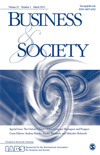Stakeholder Engagement Strategies After an Exogenous Shock: How Philip Morris and R. J. Reynolds Adapted Differently to the 1998 Master Settlement Agreement
Item
Title
Stakeholder Engagement Strategies After an Exogenous Shock: How Philip Morris and R. J. Reynolds Adapted Differently to the 1998 Master Settlement Agreement
Link
https://journals.sagepub.com/doi/10.1177/0007650319870818
List of Authors
Jennifer J. Griffin,Yoo Na Youm
Abstract
This study contributes to understanding stakeholder engagement strategies by examining competitive responses alongside sociopolitical implications after a major exogenous shock—the 1998 Master Settlement Agreement (MSA) between the “Big Four” U.S. tobacco firms and 46 state attorneys general. We compare the different stakeholder engagement strategies of the two remaining U.S. tobacco manufacturers, Philip Morris (PM) and R. J. Reynolds (RJR), between 1998 and 2017. Implications for stakeholder theory from a relatively rare natural experiment highlight the importance of simultaneously managing multiple stakeholders, inclusive of domestic and international sociopolitical and value chain stakeholders over time, for sustained value creation. Although PM and RJR initially pursued heterogeneous strategies by re-configuring relationships with relevant stakeholders, each firm’s growth prospects for the first decade post-MSA were exacerbated by various stakeholders through withholding and selective engagement strategies. Implications for how multiple, simultaneous stakeholder relationships can serve as important resources for achieving or limiting sustained growth are discussed.
Date
April 1, 2021
Publication Title
Business & Society
Publisher
SAGE
Identifier
10.1177/0007650319870818
Bibliographic Citation
"Stakeholder Engagement Strategies After an Exogenous Shock: How Philip Morris and R. J. Reynolds Adapted Differently to the 1998 Master Settlement Agreement"
Jennifer J. Griffin, Yoo Na Youm, & Ben Vivari
Business and Society 60 (4):1009-1036 (2021)
Jennifer J. Griffin, Yoo Na Youm, & Ben Vivari
Business and Society 60 (4):1009-1036 (2021)
